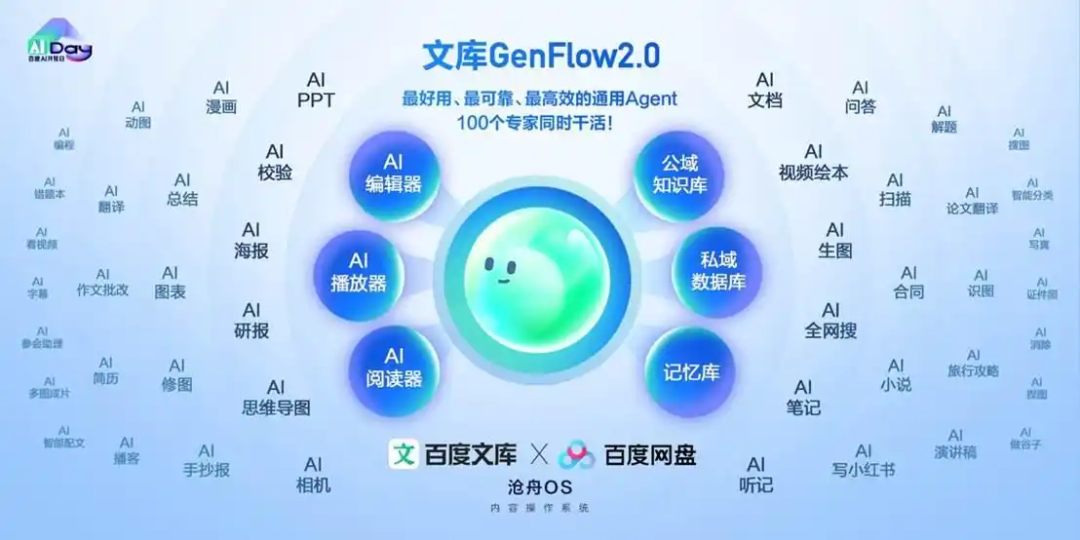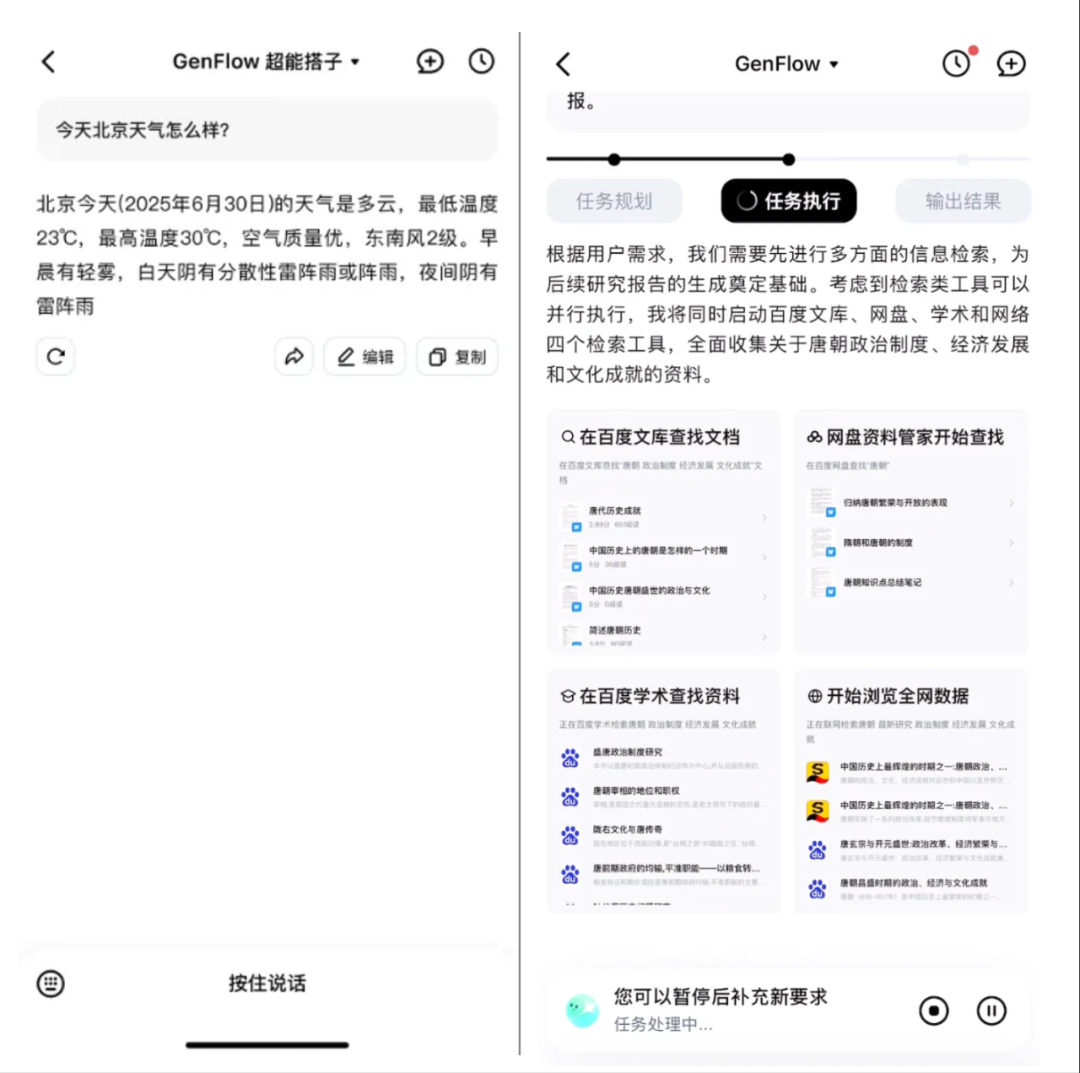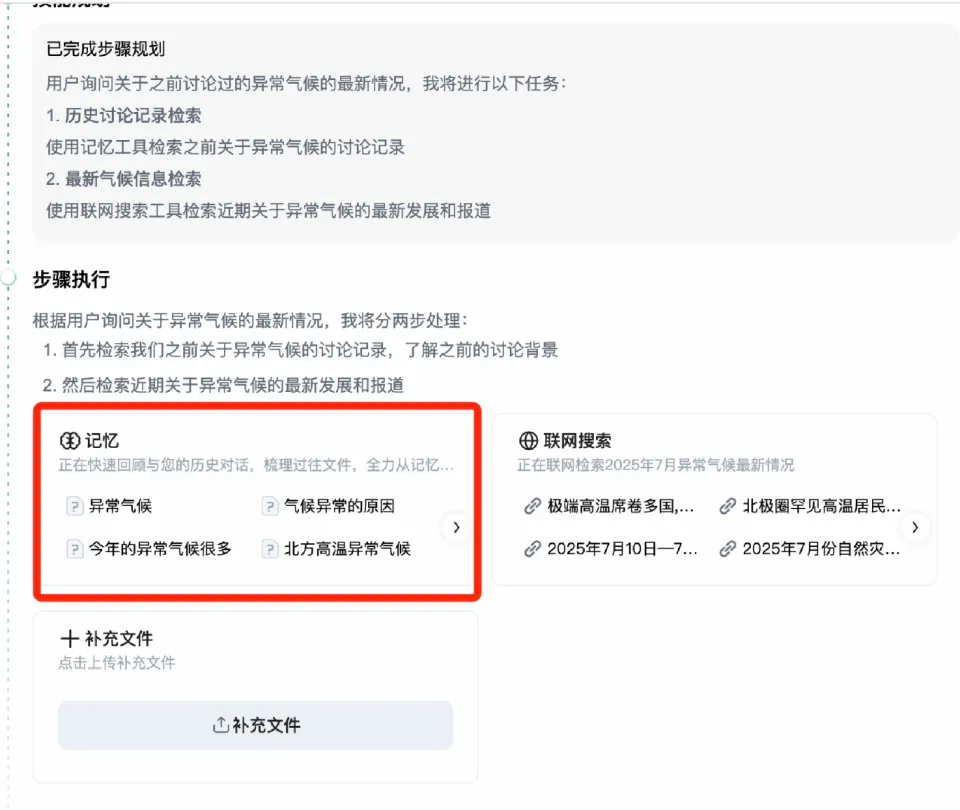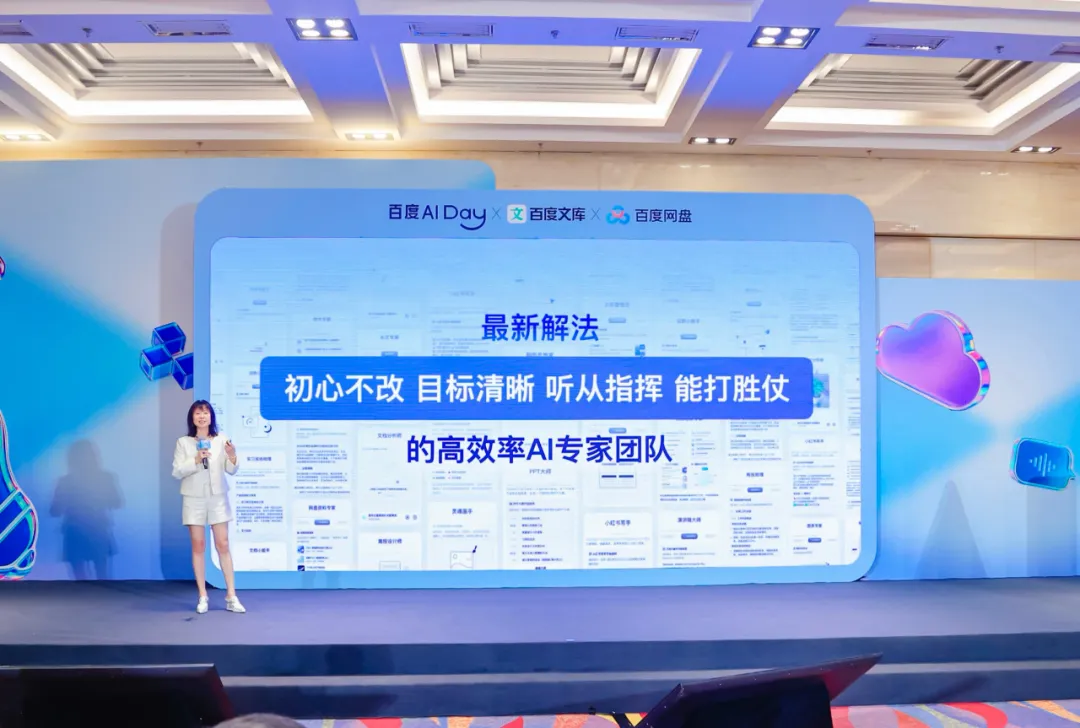Baidu Wenku: Pioneering the Future of AI Agents
![]() 08/20 2025
08/20 2025
![]() 504
504

Image Source: Baidu
Has Baidu Wenku bridged the gap between AI Agents being merely 'usable' and truly 'user-friendly'? On August 18, at Baidu AI Day, Baidu Wenku, alongside Baidu Netdisk, unveiled GenFlow 2.0, the world's first cross-platform universal AI agent. My on-site observations reveal that this innovative product supports over 100 expert AI agents working concurrently, capable of completing up to five complex tasks in parallel within just three minutes.
According to Baidu Wenku officials, GenFlow 2.0 functions as an 'AI expert team,' producing content ten times faster than mainstream competitors. It leads the industry in achieving 'minute-level delivery, process intervention, and memory traceability.'
This milestone signifies that AI Agents have evolved beyond mere eloquence to become capable and efficient problem-solvers.
Functioning Like a Human Expert Team
GenFlow 2.0 introduces a groundbreaking capability to address industry challenges such as the difficulty of describing general Agents, long waiting times, poor delivery, and lack of editability. For complex problem descriptions, GenFlow 2.0 enables users to express themselves more freely, deeply understanding user intentions, planning execution, and autonomously switching between various collaboration modes, from simple dialogues to complex tasks.
For instance, you can ask a straightforward question like, 'What's the weather like in Beijing today?' or propose a complex task, and GenFlow 2.0 will autonomously understand and collaborate based on the task's difficulty level.

Image Source: Simple Dialogue vs. Complex Task · Baidu
During tasks, users can interrupt GenFlow 2.0 at any time, pause, ask follow-up questions, modify thinking content, and even upload additional files (like calling files from Netdisk after authorization) for reference. For example, when assisting with after-school exercises, if the generated content deviates from your expectations, you can stop it, modify the outline, replan, and get back on track before continuing.
To tackle long waiting times, GenFlow 2.0 employs a proprietary Multi-Agent infrastructure, enabling minute-level parallel work and delivery. On the APP, this parallelism is even more intuitive: unlike the current serial 'waterfall' workflow of intelligent agents, GenFlow 2.0 adopts a 'side-by-side' model, allowing users to clearly see the progress of different tasks on a single screen, enhancing the interactive experience.
If you assign multiple tasks to GenFlow 2.0 simultaneously, such as creating PPTs, research reports, mind maps, and other materials on new energy vehicle market trends, each task will appear and process in parallel on a single page.
In terms of delivery, GenFlow 2.0 can summon an 'AI expert team' comprising over 100 multi-modal Agents, capable of generating PPTs, research reports, HTML, code, games, websites, and other multi-modal content simultaneously.
Using the example of understanding new energy vehicle market trends, which requires multiple tools, GenFlow 2.0's 'expert think tank' comes into play. With just one query, it can deliver a variety of materials: PPTs, visual charts, industry chain mind maps, trend research reports, new media illustrations, and more.
Regarding the stereotypical 'AI flavor,' GenFlow 2.0 excels in 'removing the AI flavor' in two ways. First, it leverages Baidu's ecosystem, integrating Baidu Wenku, academia, maps, and other Baidu resources. This not only grants access to Baidu Scholar's library of over 680 million documents and Baidu Wenku's 1.4 billion professional documents but also retrieves and calls specified materials stored in Baidu Netdisk post-authorization, combining with the user's existing resources.
For instance, if reviewing important historical knowledge points from the 'Tang Dynasty' section, GenFlow 2.0 can not only retrieve internet information but also sort and present a comprehensive view based on Baidu Wenku documents, academic research, and existing Netdisk materials.
Second, GenFlow 2.0 possesses your 'exclusive memory': historical communication records, uploaded/downloaded files, search preferences, etc., are recorded and analyzed in Wenku and Netdisk, enabling GenFlow 2.0 to generate personalized content tailored to your needs.

For example, if a previous task was interrupted, you can simply instruct, 'Continue completing the PPT presentation.' GenFlow 2.0 will expand and execute along the previous task.
Tech reviewer 'Weixi Zhibei' conducted imaginative practical tests. For instance, 'Please design a board game based on 'Empresses in the Palace.' He evaluated that the final output accurately captured the board game's core elements: multi-faction role-playing, palace struggle strategies, and classic plot events, embodying the IP's characteristics and demonstrating significant expertise.
Commenting on this, Wang Ying, head of the Wenku and Netdisk Business Departments, remarked, 'I didn't expect this kind of versatility. There's nothing you can't do, only things you can't think of.'
Additionally, GenFlow 2.0 features an AI editor, allowing users to edit online during tasks and import generated content into their personal knowledge base or a free canvas for further editing.
It's worth mentioning that regarding personal information on Baidu Wenku and Netdisk, GenFlow 2.0's permission mechanism operates as a 'veto vote.' In other words, the intelligent agent will only commence work if the user consents to its invocation. Otherwise, it will not access private domain data, prompting 'tool invocation failed.' This underscores the importance of user privacy and private domain data protection, a non-negotiable red line in AI Agent applications.
Baidu Wenku: Beyond a Tool
In April this year, Baidu Wenku and Baidu Netdisk launched the content operating system 'Cangzhou OS' and released 'GenFlow 1.0' based on this system. Within just four months, its capabilities have significantly advanced.
This is attributed to the continuous investment in the technical foundation by Wenku and Netdisk. Wang Ying stated that since the AI reconstruction, Wenku and Netdisk have adhered to MoE (Mixture of Experts), enabling the invocation of different models based on tasks and steps. GenFlow 2.0 has built its own Multi-Agent engine, actively optimized context engineering, constructed a model information ecosystem, and achieved one-stop end-to-end delivery for complex tasks.
Simultaneously, GenFlow 2.0 is compatible with the MCP protocol, flexibly accessing third-party service ecosystems. Based on Cangzhou OS, jointly released by Wenku and Netdisk, through MCP Server and Agent to Agent, GenFlow 2.0 has pioneered the use of MCP for product and ecosystem connection, fully opening up Wenku and Netdisk's capabilities to facilitate use by various users, including manufacturers, enterprise users, intelligent agent applications, and developers.
The value lies in Baidu Wenku and Netdisk's desire not to work in isolation but to unlock ecological value through their capabilities.
I also observe that Baidu Wenku has laid the groundwork for commercialization. While providing 'AI expert team' services to C-end users and bridging the gap between AI Agents being 'usable' and 'user-friendly,' it has also made profound layouts on the B-end and enterprise fronts.
In a sharing, the product head of Baidu Wenku mentioned that they have already collaborated with enterprises and institutions in various fields, such as local cultural tourism and education, generating revenue.
Honor was invited to share on stage, with its head of AI ecological products stating that as one of the first global hardware vendors to access the MCP ecosystem, Honor has natively integrated GenFlow 2.0 into its intelligent assistant YOYO, realizing system-level native scheduling between AI Agents and hardware vendors.

Image Source: Baidu
Regarding the launch of GenFlow 2.0, Baidu Wenku and Netdisk harbor high expectations, believing it has opened up the entire process from 'creation, editing, storage, and management' to 'searching, viewing, using, and sharing,' making AI truly 'omnipotent and omnipresent.'
Many media outlets have commented that this iteration showcases Wenku and Netdisk's ambitious goals in the general Agents field: the 'expert team' model led by GenFlow 2.0 has ushered in a new era of 'co-creative' human-computer interaction.
Setting aside grandiose phrases, I see that after being reconstructed by large models, Baidu Wenku has broadened its path.
Robin Li once predicted that 2025 would be the year of AI application explosion. Subsequent industry progress has validated his judgment. For example, ByteDance has invested in Doubao and Jianying, Alibaba has chosen Quark and Tongyi, and after launching Nano AI Super Search, 360 has updated its corporate roadmap to 'All in Agent.'
Post the 'AI Six Dragons' bubble, especially considering the cost-effectiveness of investment and user acquisition, large companies have gradually shifted their focus to a batch of AI-transformed legacy products.
Based on this logic, Baidu Wenku and Netdisk have fully integrated. Their new positioning is described as a 'one-stop AI content acquisition and creation platform' and a 'one-stop content service platform,' connected by 'super productivity.'
As Wang Ying previously stated, the challenge lies in breaking the deadlock and transforming historical achievements from burdens into boosters for new products, whether native AI products or transformed ones. Large models enable these two products to build a seamless bridge for users, from content creation to consumption. She hopes to use the most advanced technology and products to solve all user needs in one stop.
GenFlow 2.0 represents a leap forward in the direction of 'super productivity,' elevating AI Agents from mere 'tools' to 'partners,' becoming true 'intelligent assistants' that efficiently help users complete tasks.
In other words, as two 'national applications' of Baidu in the mobile internet era, the synergy between Wenku and Netdisk in the AI era not only impacts the existing AI market landscape but also gives Baidu a strong competitive edge in AI for C and productivity.
Especially for the latter, these two AI applications, with nearly 100 million monthly active users, provide a reliable ecological entry for advancing multiple new AI businesses within Baidu, exploring the path between AI Agent application landing and commercialization.
Together with the core search business, Baidu Wenku and Netdisk constitute the two major pillars of AI for C in Baidu's industry positioning in the 'AI era of Baidu,' radiating outward and ultimately making AI practical and accessible to the public.
The value of this exploration is being tested by users of GenFlow and Baidu Wenku and Netdisk.
Reference Materials:
Baidu, 'Wenku GenFlow 2.0! Claim Your "AI Expert Team"'
Photon Planet, 'Baidu's Lifesaver, Written in Wenku'







